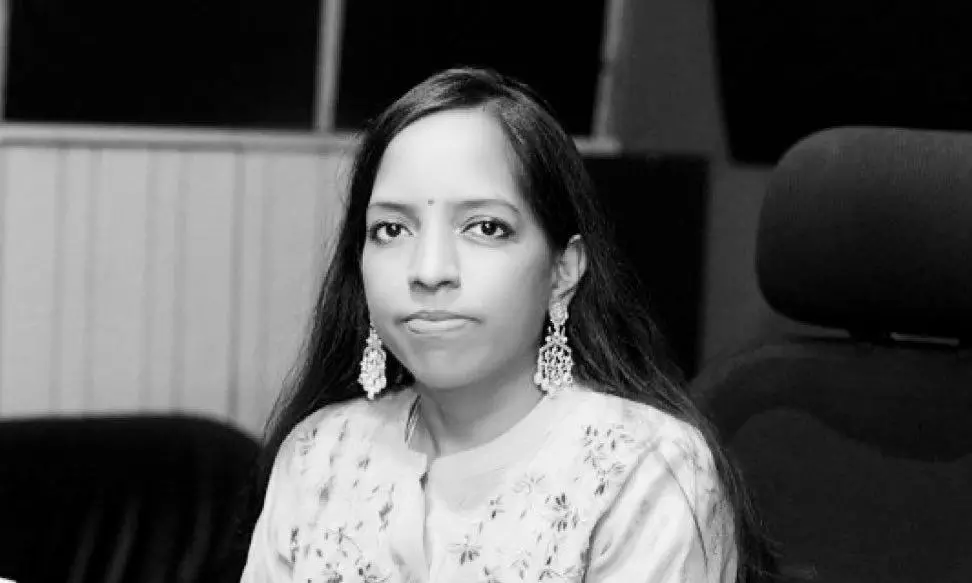Bhavatharini obituary: Her unique voice would follow no rule of genre
The National Award-winning singer-music director could traverse with ease from a childlike 'Mayil pola' to a seductive 'Masthana masthana'


In his 2014 book Ilaiyarajavai Kelungal ('Ask Ilaiyaraaja') which features his responses to questions from a set of readers, the maestro very matter-of-factly mentions his daughter Bhavatharini as a very ‘unique voice.’ The answer has no great detail.
To a question on what he would call 'unique voices', Ilaiyaraaja says: “1) Nat King Cole, 2 Banumathi Amma, 3 ) S Varalakshmi amma, 4. Bhavatharini 5) Swarnalatha. It is rare for anyone to have a voice like them.”
Beyond fatherly pride
And Ilaiyaraaja was not particularly boasting. There is something profoundly unsettling yet magically enchanting about Bhavatharini’s voice. She could sing a peppy number with the same ease as she could a haunting melody.
Bhavatharini with her father Ilaiyaraaja
If her National Award-winning Mayil pola (Bharathi, 2000) could tug your heart, her Thendral varum (Friends, 2001) could warm it up. If there is one song of hers that could move you deeply into realms of silence that only music is capable of taking you to, there is another that will make you stand up and tap your feet.
In 1995, Bhavatharini rendered her first number for her father for the film Rasaiah, a Prabhu Deva-starrer. The peppy Masthana masthana went on to become an instant hit.
Difficult to categorise
But it was difficult to box her into a particular category or simply put a finger on her voice and say it could deliver only a particular genre.
Two years after she sang the foot-tapping Masthana, Bhavatharini came up with a hauntingly mellifluous Ithu sangeetha thirunalo (Kaadhalukku Mariyadhai – 1997). The title song set the tone for the gentle romantic film, which went on to become a blockbuster hit. In the same film, which featured actors Vijay and Shalini, Bhavatharini also sung the famous Ennai thalatta varuvaala along with Hariharan.
In Oru Naal Oru Kanavu (2005), Bhavatharini sang what remains another favourite for Ilaiyaraaja fans – Kaatril varum keethame. The stunning En veetu jannal etti from Raman Abdullah (1997) is yet another unique Bhavatharini number.
Just like Oliyile therivadhu devathaiya from Azhagi (2002), a song both composed and written by Ilaiyaraaja.
Mayil pola from Bharathi got her the National Award. In every song that remained a celebrated Ilayaraja number, Bhavatharini managed to leave a stamp with her distinct voice. She could effortlessly traverse to a childlike Mayil pola from a seductive Masthana masthana.
Famous brothers
Besides her father, Bhavatharini has collaborated with both her brothers Karthik Raja and Yuvan Shankar Raja, and other music directors including Sirpy and Harris Jayaraj.
Bhavatharini flanked by her cousin Venkat Prabhu (left) and brother Yuvan Shankar Raja.
Her haunting interlude in the peppy Meherezylaa in Maanadu (2021) – for which Yuvan had scored the music and sang along with her (the film was directed by their cousin Venkat Prabhu) – stands out for its tenderness in a foot-tapping number.
Bhavatharini was also known for her humming. In his musical Ullasam (1997), Karthik Raja roped in his sister just to hum for a song that was rendered by Swarnalatha and Kamal Haasan (Muthe muthamma).
As a music director
As a music director, Bhavatharini worked across languages. In fact, her launch as a music director happened with Indian-English film Mitr My friend (2002) starring Shobana and directed by Revathi.
Her music was characterised by a sense of mystery and reticence – something that reflected her persona, too. To the end, Bhavatharini remained a very reticent person – her interviews and her live performances betrayed a sense of shyness not typical of her background.
Rare voice
Along with Swarnalatha, Bhavatharini was, as her father said, a distinctly rare voice. Just like Swarnalatha, Bhavatharini passed away just as we evolved our tastes enough to appreciate her voice, and hoped that it would always be there to bring some new elements and freshness to film music.
Along with Swarnalatha, Bhavatharini was a short-lived magic. Yet the songs will live long enough to soothe the nights of generations to come.

